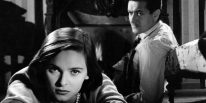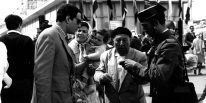Nominated for the Best Foreign Language Film award at that year’s Oscars, Plácido is a scabrously mocking portrait of an impoverished man who spends the day before Christmas trying to avoid foreclosure on his motorbike. In Plácido, the farce of appearances – instanced by the charity campaign ‘Sit a poor person down at your table’ (It’s about enjoying the needy for a night of warmth and affection, sharing Christmas Eve with wealthy families) develops into a biting and harshly funny criticism of bourgeois attitudes, of bureaucracy and the hypocrisy of Catholicism. In collaboration with screenwriter Rafael Azcona, Plácido is his first film together, and the first in which the director uses systematically the sequence shot, a narrative choice that will become one of the great masters of European cinema. Berlanga, eternal admirer of the so-called secondary actors,had a impeccable staff in Plácido where everyone does a perfect job.


